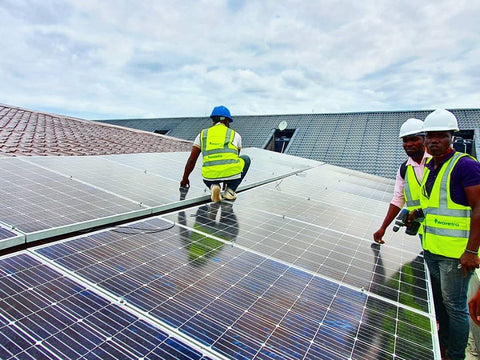
Chidi Okonkwo, a Nigerian businessman who relies on solar panels to power his grocery store, likened the government’s proposed ban on solar panel imports to “outlawing umbrellas during the heaviest rains.” In a country where the national grid provides only a few hours of electricity daily, solar energy is not a luxury—it is a necessity for businesses, households, and essential services.
The federal government is pushing forward with the Presidential Executive Order No. 5, a policy prioritizing local content in science, engineering, and technology. Uche Nnaji, Minister of Science and Technology, defended the decision, arguing that Nigeria is investing in renewable energy infrastructure and can meet its solar energy needs domestically.
“We have lithium in abundance here in Nigeria, so Mr. President is already taking action. The lithium we have will be processed and used as batteries for electric vehicles,” Nnaji stated.
However, energy experts warn that the plan mirrors the 2019 decision to shut Nigeria’s land borders in an attempt to curb smuggling—particularly of rice—which ultimately failed to bring down food prices. Today, Nigerian consumers are still grappling with skyrocketing food costs despite the reopening of borders.
“They know the prices will rise,” said Aisha Mohammed, an energy analyst at the Lagos-based Center for Development Studies. “Solar panels in Nigeria are already expensive, and banning imports will only make them less affordable. This could discourage businesses from investing in solar energy.”
Jide Pratts, Country Manager of Trade Grid, criticized the plan, calling it a rushed policy. “We have seen similar attempts to stop imports in various sectors to boost local capacity, but I struggle to name one case where it has worked. These policies are often introduced hastily,” Pratts said.
While acknowledging Nigeria’s lithium reserves, Pratts pointed out that the country has yet to extract and standardize it in commercial quantities. “You do not stop imports until you provide incentives for local capacity to meet at least 70 percent of demand. Even then, why stop it? Nigeria needs to decide whether it wants a free market or a controlled economy,” he argued.

Other experts highlighted Nigeria’s underdeveloped solar manufacturing sector. Although some local assembly plants exist, they lack the scale to meet national demand. “Locally produced solar panels are often more expensive than imports, making them inaccessible to the average Nigerian,” said Chioma Nwachukwu, a project manager at a solar energy nonprofit in Kano.
Imported solar systems in Nigeria range from ₦400,000 for a basic setup to ₦20 million for a fully off-grid solution. These prices reflect varying energy needs and levels of independence from the national grid.
For instance, Juwon Adesanya, a social media strategist, spent ₦4 million in 2024 on a 5kVA solar system with six 400W panels and a 5.12kWh lithium battery. His setup powers multiple appliances, including TVs, freezers, laptops, and a washing machine.
More advanced systems, costing between ₦10 million and ₦30 million, provide near-total energy independence. A ₦10–₦20 million 10kVA hybrid system includes a 10kWh inverter, 10kWh battery, and 9kWh solar panels, supporting high-energy appliances with up to 15 hours of backup power. At the top tier, a ₦30 million 15kVA system features a 12kW inverter, 33kWh battery storage, and 11kW solar panels, allowing for uninterrupted power for air conditioners and large household appliances.
Experts warn that a ban on solar panel imports could drive up costs by 40–60%, making renewable energy less accessible to low-income families. “That will push people back to generators and dirty fuels, worsening pollution and energy poverty,” cautioned Tunde Olawale, a renewable energy consultant.
The hardest-hit areas would be rural communities, where solar power is often the only available energy source. Many off-grid solar companies depend on imported equipment to provide electricity for homes, schools, and healthcare facilities.
For Adebola Ogunleye, a frozen food vendor, the potential impact is deeply personal. “If solar gets too expensive, I’ll have to raise my prices,” he lamented. “But my customers are already struggling. How much more can they endure?”
As Nigeria debates this policy shift, the long-term implications could shape the future of energy access for millions. Will the country bolster its local solar industry in time, or will this decision lead to greater energy insecurity?


